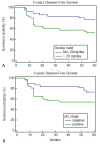Role of Clinical-Demographic Data in Survival Rates of Advanced Laryngeal Cancer
- PMID: 33804150
- PMCID: PMC8001944
- DOI: 10.3390/medicina57030267
Role of Clinical-Demographic Data in Survival Rates of Advanced Laryngeal Cancer
Abstract
Background and Objectives: Laryngeal cancer is one of the most common cancers in the upper aerodigestive tract, and tobacco and alcohol habits are the most relevant risk factors. The role of these risk factors in the incidence of laryngeal carcinomas is well known, yet only a few studies have been conducted on their role as risk factors of prognosis. The aim of the study was to assess the impact of clinical-demographic data on overall survival (OS), disease-free survival (DFS), and disease-specific survival (DSS) in patients with advanced-stage laryngeal cancer (Stage III-IV) who underwent total laryngectomy. Materials and Methods: This retrospective study was carried out on patients with Stage III-IV laryngeal squamous cell carcinoma treated with total laryngectomy between 2004 and 2014. For each patient, clinical and anamnestic data were collected and collated in a database, including alcohol and smoking habits. Results: Considering the variable age, family history, alcohol, grading, subsite, stage, pT stage, pN stage, and adjuvant therapy, no statistical significance was found for five-year OS. Smoking was the only variable that was statistically significant (p = 0.0043). A relevant difference was noted in the five-year DFS between pN-negative and pN-positive tumors (74.3% vs. 55.26%, respectively; p = 0.056), and a statistically significant difference was found between non- and ≤20 cigarettes/day smokers and heavy smokers (77.78% vs. 53.66%, respectively; p = 0.021). The five-year disease-specific survival rate was 68.83%, and a significant difference was detected for the smoking and pN stage variables. Heavy smokers (43.90% died vs. 16.67% of the non- and ≤20 cigarettes/day smokers; p = 0.0057) and pN-positive (42.1% died vs. 20.51% of the pN-negative patients; p = 0.042) patients had a worse prognosis. Conclusion: Smoking in our study was found to be an important independent risk factor for worse OS and DSS in patients with advanced laryngeal cancer.
Keywords: advanced laryngeal cancer; laryngeal cancer; tobacco-related cancers; total laryngectomy.
Conflict of interest statement
The authors declare that they have no competing interests.
Figures
References
-
- Allegra E., La Mantia I., Bianco M.R., Drago G.D., Le Fosse M.C., Azzolina A., Grillo C., Saita V. Verbal performance of total laryngectomized patients rehabilitated with esophageal speech and tracheoesophageal speech: Impacts on patient quality of life. Psychol. Res. Behav. Manag. 2019;12:675–681. doi: 10.2147/PRBM.S212793. - DOI - PMC - PubMed
-
- de Vincentiis M., De Virgilio A., Bussu F., Gallus R., Gallo A., Bastanza G., Parrilla C., Greco A., Galli J., Turchetta R., et al. Oncologic results of the surgical salvage of recurrent laryngeal squamous cell carcinoma in a multicentric retrospective series: Emerging role of supracricoid partial laryngectomy. Head Neck. 2015;37:84–91. doi: 10.1002/hed.23563. - DOI - PubMed
MeSH terms
LinkOut - more resources
Full Text Sources
Other Literature Sources




